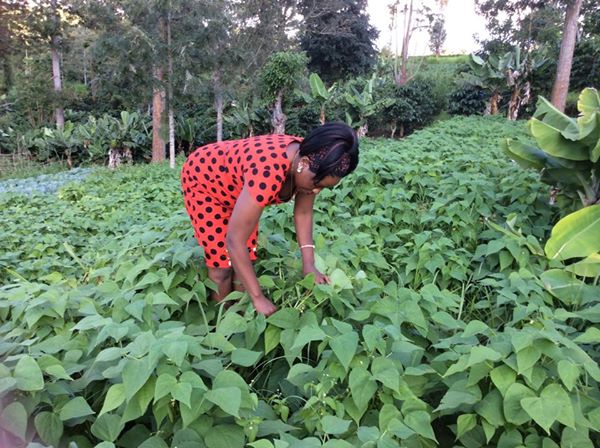Making money from farming: Deborah is among the few farmers in Werugha; Marumange village in Wundanyi Sub County who practices mixed farming in her 2 acres of land.
Deborah began farming in 2008 after several attempts of job searching in order to meet her needs and those of her family.
Together with her husband James Mwadime, they began their first project of dairy keeping with one cow which has now increased into four dairy cows.
However, due to the scarcity of fodder, they began to farm.
This prompted them to engage the services of extension officers who offered them with advise on how to prepare the land and on the kind of crops to grow.
List of best cars for Kenyans earning below Sh. 100,000
They explain to us that for the first six months,things were not easy as they thought and almost gave up since the market price of the vegetables they had grown had dropped down totally.
”We started by planting vegetables; sukumawiki and cabbages however by the time we were harvesting, the market rates had dropped and we were selling them at a throw away price.
We could not even raise the amount of money we had invested in the farm since the expenses of the chemicals, fertilizer and even labour was very expensive.
Not one to give up easily, Debora Wakesho was undeterred by stereotypical beliefs that farming is an occupation reserved for men.
Wakesho’s farming exploits have earned her recognition beyond her home county of Taita Taveta. In 2008, she decided to try horticultural farming as a full time venture. Today, she is a much sought after peas and French beans farmer.
“There is big money in horticultural farming,” Wakesho says at her two-acre lush green farm at Kese village, Taita Sub-County. “Last, week I sold 600 kilogrammes of peas at Sh80 per kilo.” Tucked in the scenic Taita Hills, her farm is a beehive of activity as other farmers visit it to benchmark. Her model farm has attracted even dignitaries among them former Agriculture PS Romano Kiome. She earns Sh48, 000 every two weeks by selling peas to Vegpro Company Ltd.
“Whenever I harvest, I plant different crops like Irish potatoes, cabbages, and spinach to enhance the fertility of the soil and boost my earnings,” says Wakesho. Wakesho is a member of a group of small scale farmers who sell their produce to Vegpro. The other farmers are in Mwatate, Mgange and Wumingu locations, areas endowed with immense potential for horticultural production.
Vegpro’s Outgrowers Manager Atul Patel says the company buys peas and French beans from 1,800 farmers from Taita Taveta. The company pays out between Sh. 500,000 and Sh1.2 million to farmers every two weeks.
“We’ve been sitting on a goldmine because we lacked information on peas farming. I am glad I decided to exploit this potential that has been enriching other people as we watch,” says Wakesho. To make it in the tough venture, more so in the predominantly harsh environment of the Coast region, calls for wit and sturdiness, says the resilient mother of three.
When she decided to try her luck in horticulture, many dismissed her as a joker and a dreamer, but she remained unbowed. Her efforts have been recognised beyond her home county of Taita Taveta.
She won herself recognition and a prize in the just concluded Mombasa International Show for being one of the best horticultural farmers in the Coastal region. Wakesho says she is committed to sensitising her community about farming as an alternative source of income to alleviate poverty, especially among women.
“I used the proceeds from farming to build a modern house. I have also bought some dairy cows and a water pump to supplement my income. My children are in private schools and my family is now living comfortably,” she says. “This is a capital-intensive undertaking that requires enormous resources to establish and sustain. But this should not scare away people,” she says on making money from farming.









